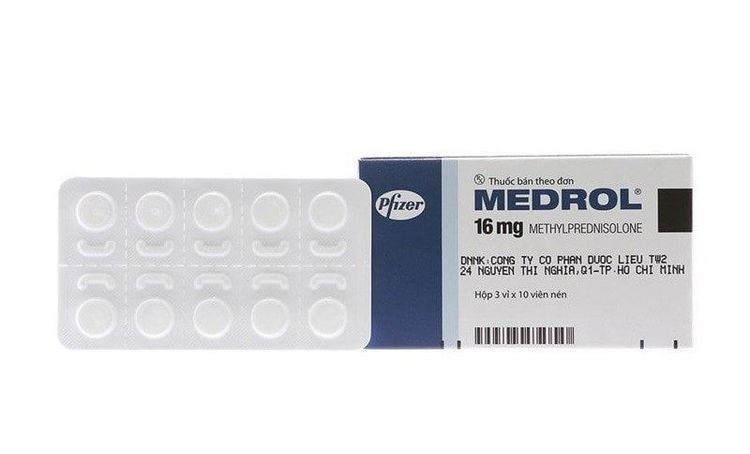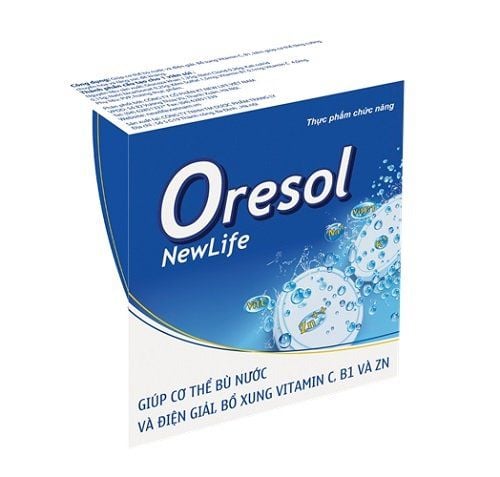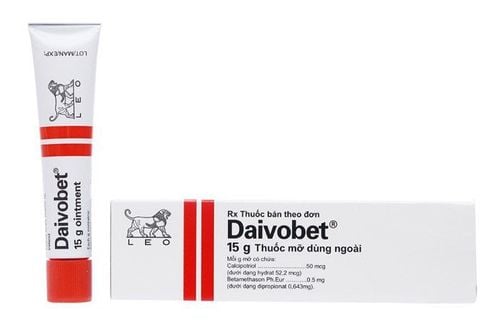This Article is Professionally Reviewed by Pharmacist Nguyễn Thị Thanh - Department of Pharmacy, Vinmec Times City International Hospital
Medrol 16mg is a corticosteroid known for its potent anti-inflammatory effects, used to treat various inflammatory conditions.
1. What is Medrol 16mg used for?
The composition of Medrol 16 mg is methylprednisolone 16 mg content
Excipients: Lactose, cornstarch, sucrose, calcium stearate, liquid paraffin...
Methylprednisolone is a corticosteroid with anti-inflammatory effects and is approximately four times more potent than hydrocortisone.
2. Uses of Medrol 16mg
The uses of Medrol 16mg include the following indications:
2.1. Indications for Endocrine Disorders
- Primary or secondary adrenal insufficiency
- Congenital adrenal hyperplasia
- Non-suppurative thyroiditis;
- Hypercalcemia associated with cancer.
2.2. Indications for Non-Endocrine Disorders
- Rheumatic Disorders: The drug is used as adjunctive therapy for short-term treatment (helping patients overcome acute or severe phases) in conditions such as:
- Psoriatic arthritis;
- Rheumatoid arthritis;
- Ankylosing spondylitis;
- Acute or subacute bursitis;
- Acute nonspecific tenosynovitis treated with Medrol 16mg;
- Acute gouty arthritis;
- Post-traumatic osteoarthritis;
- Synovitis
- Epicondylitis
- Collagen Diseases: The drug is used during severe phases or as maintenance therapy in cases such as:
- Systemic lupus erythematosus;;
- Dermatomyositis
- Acute rheumatic fever;
- Polymyalgia rheumatica
- Medrol 16mg is indicated for giant cell arteritis
- Dermatological Conditions:
- Exfoliative dermatitis
- Mycosis fungoides
- Severe psoriasis
- Severe seborrheic dermatitis
- Pemphigus;
- Bullous dermatitis herpetiformis;
- Severe erythema multiforme.
- Allergic Conditions: The drug is used to control severe or intractable allergic conditions that fail to respond to standard treatments:
- Drug hypersensitivity reactions
- Contact dermatitis
- Atopic dermatitis;
- Allergic rhinitis;
- Serum sickness;
- Bronchial asthma.
- Ophthalmic Disorders: Medrol 16mg is indicated for acute and chronic severe allergic inflammation of the eyes and their appendages, such as:
- Allergic corneal ulcers;
- Allergic conjunctivitis;
- Herpes zoster keratitis;
- Keratitis;
- Anterior uveitis;
- Chorioretinitis;
- Retinochoroiditis
- Optic neuritis;
- Sympathetic ophthalmia;
- Iritis, iridocyclitis.
- Respiratory Conditions:
- Symptomatic sarcoidosis;
- Loeffler's syndrome;
- Berylliosis
- Fulminating or disseminated pulmonary tuberculosis used alongside antituberculous chemotherapy;
- Aspiration pneumonia.
- Hematologic Disorders:
- Idiopathic thrombocytopenic purpura in adults;
- Secondary thrombocytopenia in adults;
- Acquired hemolytic anemia;
- Erythroblastopenia;
- Congenital hypoplastic anemia.
- Cancer Treatments: The drug is used temporarily for:
Leukemia, adult lymphomas;
Acute leukemia in children. - Edema: Medrol 16mg aids in diuresis and reduces proteinuria in nephrotic syndrome without azotemia or nephrotic syndrome due to systemic lupus erythematosus.
- Gastrointestinal Disorders: Medrol 16mg helps patients overcome critical phases of conditions such as:
- Ulcerative colitis;
- Regional enteritis.
- Neurological Disorders:
- Multiple sclerosis;
- Edema associated with brain tumors.
- Organ Transplants:
- Other Indications:
- Tuberculous meningitis with subarachnoid space blockage or threatened obstruction;
- Trichinosis.
- And conditions related to the myocardium and nervous system.

3. Dosage of Medrol 16mg
The initial dosage of methylprednisolone typically ranges from 4-48mg per day, adjusted based on the severity of the condition. Lower doses are sufficient for less severe conditions, while higher initial doses may be required for certain patients. Conditions requiring higher doses of methylprednisolone include:
- Multiple sclerosis (200mg/day);
- Cerebral edema (200–1000mg/day);
- Organ transplantation (7mg/kg/day).
If clinical response is not achieved after a period of methylprednisolone usage, the medication should be discontinued, and an alternative therapy should be implemented. For long-term treatments, discontinuation of methylprednisolone must be done gradually to avoid abrupt cessation. Once an adequate response is observed, the maintenance dose should be established by gradually reducing the initial dose in small increments, adjusting intervals to maintain clinical effectiveness.
Situations requiring dose adjustment for methylprednisolone include:
- Changes in clinical status following disease remission or exacerbation;
- Individual patient response to methylprednisolone;
- Stressful conditions unrelated to the current treatment (this may necessitate a temporary increase in methylprednisolone dosage).
Additionally, methylprednisolone can be used in alternate-day therapy: doubling the usual daily corticosteroid dose, administered in the morning every other day. This approach helps maximize the benefits of corticosteroids while minimizing unwanted side effects, preventing hypothalamic-pituitary-adrenal axis suppression, Cushing-like states, corticosteroid withdrawal symptoms, and growth inhibition in children.
4. Contraindications for Medrol 16mg
- Patients with systemic fungal infections;
- Hypersensitivity to methylprednisolone;
- Administration of live or live-attenuated vaccines in patients receiving immunosuppressive corticosteroid doses.

5. Side Effects of Medrol 16mg
- Infections: Increased susceptibility to infections, including opportunistic infections.
Immune System Disorders: Hypersensitivity reactions such as anaphylaxis, reduced response to skin tests. - Endocrine Disorders: Cushing's syndrome, hypothyroidism, abrupt steroid withdrawal syndrome.
- Metabolic and Nutritional Disorders: Fluid retention, glucose imbalance, increased appetite, heightened insulin requirements, metabolic acidosis, sodium retention.
- Psychiatric Disorders: Abnormal behavior, mood swings, anxiety, confusion, insomnia, irritability, psychotic episodes, personality changes, neuropsychiatric symptoms.
- Nervous System Disorders: Memory loss, cognitive impairments, seizures, headaches, increased intracranial pressure, epidural lipomatosis.
- Eye Disorders: Cataracts, exophthalmos, glaucoma, central serous chorioretinopathy.
- Ear and Inner Ear Disorders: Dizziness;
- Congestive Heart Failure
- Vascular Disorders: Hypertension, Hypotension;
- Respiratory, Thoracic, and Mediastinal Disorders;
- Gastrointestinal Disorders: Abdominal distension, Abdominal pain, Diarrhea, Gastric hemorrhage, Intestinal perforation, Nausea, Esophagitis, Pancreatitis, Gastrointestinal ulcers, Gastrointestinal bleeding…;
- Skin and Subcutaneous Tissue Disorders: Angioedema, Bruising, Erythema, Hirsutism, Pruritus, Skin atrophy, Striae, Urticaria…;
- Musculoskeletal and Connective Tissue Disorders: Arthralgia, Growth retardation, Muscle wasting, Muscle weakness, Myalgia, Neuropathic arthropathy, Osteosclerosis, Osteoporosis, Pathological fractures;
- Irregular Menstruation;
- Fatigue, Delayed Wound Healing;
- Increased Alanine Aminotransferase, Increased Aspartate Aminotransferase, Increased Blood Alkaline Phosphatase, Hypokalemia, Carbohydrate Imbalance, Increased Intraocular Pressure, Increased Urinary Calcium…
- Surgical complications, Wounds, Toxicity: Compression fractures of the spine, Achilles tendon rupture.
6. Medrol 16mg for Pregnant and Breastfeeding Women
There is no evidence that corticosteroids (Medrol 16mg) have any effect on reducing fertility.
For pregnant women: Some animal studies indicate that administering high doses of corticosteroids to the mother can cause fetal abnormalities, but it appears that corticosteroids do not cause congenital malformations when used in pregnant women. Since there is insufficient evidence of safety in pregnant women, Medrol 16mg should only be used during pregnancy when absolutely necessary.
Some corticosteroids can cross the placenta, and there may be an increased incidence of low birth weight in infants born to mothers who have taken corticosteroids. Therefore, infants born to mothers who have received significant doses of corticosteroids should be carefully monitored for signs of adrenal insufficiency.
Corticosteroids are excreted in breast milk and may inhibit growth and interfere with the endogenous production of glucocorticoids in nursing infants. Therefore, Medrol 16mg should only be used in breastfeeding women if the benefits to the mother clearly outweigh the risks to the child.
For more health, nutrition, and beauty tips, visit Vinmec International General Hospital to safeguard the health of yourself and your loved ones.
To schedule an appointment at the hospital, please contact the HOTLINE or book directly HERE. Download the MyVinmec App to manage, track, and schedule appointments conveniently anytime, anywhere.













